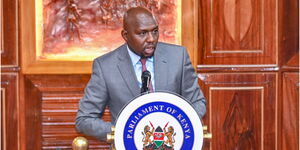The National Assembly has overturned a key directive from President William Ruto’s administration, halting the plan to make the use of the Electronic Government Procurement (eGP) system mandatory across all public institutions.
The decision came after the Committee on Delegated Legislation, chaired by Ndia MP George Kariuki, recommended the cancellation of key circulars issued by Treasury Cabinet Secretary John Mbadi and the Head of Public Service in March and June 2025.
The committee termed the directives 'unconstitutional and ultra vires', saying they violated provisions of the Public Procurement and Asset Disposal Act.
In its report tabled before the National Assembly, the committee found that circulars dated March 26, 2025, and June 5, 2025, unlawfully sought to compel all accounting officers to migrate to the eGP platform by July 1, 2025.
“The Committee concurs with the annulment of Circular No. 06 of 2025 and further recommends that the earlier circulars by the National Treasury and the Head of Public Service be declared null and void,” the report reads in part.
Lawmakers agreed that the directives had created confusion within ministries and state agencies that had already planned projects for the 2024/2025 financial year under the existing manual procurement framework.
Additionally, they also warned that enforcing the eGP system mid-year would disrupt ongoing tenders and delay service delivery.
Resolutions
In a key resolution, the Committee recommended that all public projects for the 2024/2025 financial year proceed as initially planned, allowing the use of both manual and electronic procurement systems. This, it said, would ensure flexibility and efficiency in managing government contracts.
“The implementation of projects already approved under the current financial year should not be interrupted. Procuring entities should be allowed to proceed using either system in line with Section 70(1) of the Procurement and Asset Disposal Act,” the report noted.
Future Directives
The committee also directed that any future changes to the procurement system must be accompanied by regulations tabled before Parliament for approval, faulting the Treasury for bypassing legislative oversight when issuing the earlier circulars.
Moving forward, the committee recommended that the National Treasury submit detailed regulations to guide any new circular on e-procurement before implementation. This, it said, would safeguard transparency, accountability, and adherence to the law.
Court Ruling
In September this year, the High Court temporarily suspended the government’s directive requiring all state agencies and county governments to exclusively use the eGP system for procurement.
The court further ordered that the National Treasury and Public Procurement Regulatory Authority (PPRA) must accept and process both manual and electronic submissions equally, provided they meet the legal requirements under the Act.












